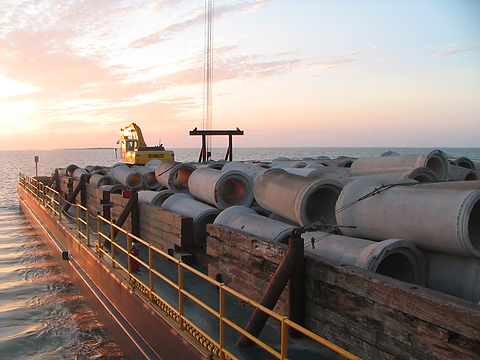Near shore artificial reefs build fish habitat, coastal economy
 Culverts head out to be dumped in the ocean near Port Mansfield last week. Photo by TPWD.
Culverts head out to be dumped in the ocean near Port Mansfield last week. Photo by TPWD.Reefing operations began in Port Mansfield last week in a joint project between the Coastal Conservation Association, Habitat Today for Fish Tomorrow and Texas Parks and Wildlife.
Over 4,000 concrete culverts will be deployed about seven nautical miles offshore from Port Mansfield. These artificial forms will join 800 other culverts and an old tug boat on the Gulf floor. The concrete tubes are sunk to provide habitat for fish and marine life. The project is expected to increase marine wildlife numbers and create a recreational diving destination.
TPWD contracted Cajun Maritime LLC to reef the culverts. The Louisiana based company moved two-thirds of the culverts before the project was delayed due to Tropical Storm Don. The remaining 1,000 culverts are expected to be reefed in mid-August.
“This is the largest reefing effort TPWD has conducted at a nearshore reef,” said Dale Shively, TPWD Artificial Reef Program Leader. “Our contractor, Cajun Maritime LLC, has done an outstanding job so far in moving the culverts to the reef site. This project represents another effort through the partnership of TPWD and CCA to enhance marine habitat in the Gulf of Mexico, making better fishing opportunities available to all. It also provides increased revenue to the local economy through fishing and diving opportunities.”
In transporting the culverts to the reef site, a 200-foot barge loaded with tons of concrete made several trips through the Port Mansfield harbor and channel. Water depths in many places were less than five feet, causing the tugboat to push itself and the barge through mud.
Shively said the arrival of Cajun Maritime in the sleepy fishing town of Port Mansfield generated lots of public interest. The contractor came into town with a large ocean-going tug, 200-foot barge, 330-ton crane, 100-ton crane, four simis, two front-end-loaders, one bucket tractor and 18 personnel in addition to other supervisory personnel from around the state. Most of the rooms at the town’s one hotel were booked for the project, with every open restaurant full at the end of the day, Shively said.
The Texas Artificial Reef Program’s near shore and public reefing effort began in 2006 and aims to establish a 160-acre reef site at each major port in Texas. The program has 63 reef sites in the Gulf of Mexico including other near shore reef sites at Port Isabel, Corpus Christi, Port Aransas, Matagorda and Freeport.
Other reefing projects in the Gulf include over 130 oil and gas platforms and the Texas Clipper Reef Project. In the Ships-to-Reefs segment of the program, 12 Liberty ships which ironically survived combat sinking attempts during World War II were sunk in the 1970s to create the nexus of the reefing project along the coast.
See the dozens of unique artificial fish habitat models, fish attractors and fish cover used at fishiding.com, the industry leader and only science based, man made and artificial fish habitat, proven to provide all fish with cover they prefer to prosper.



